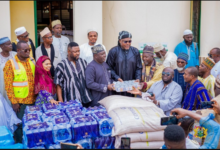
President Nana Addo Dankwa Akufo-Addo has attributed challenges in land administration at urban areas to the customary system of land tenure.
The customary system dictates that lands are owned by stools, skins, families or clan usually held in trust by the chief, head of family, clan, or land priests for the benefit of members of that group.
According to him, although the “abunu” and “abusa” systems under the customary system have been the pivot around which farming practices revolved in the country, the system had resulted in double sale of land, wrongful sale of land by people without the capacity, multiple claims to land by different stool, clan or families, among others, especially at urban centres such as Accra.
To this end, President Akufo-Addo has called on traditional authorities, Lands Commission and other stakeholders to work together towards the implementation of the Land Act 2020 (Act 1036), which provides laws to deal with the challenges.
He was speaking at the opening of a four-day National Land Conference organised by the Ministry of Lands and Natural Resources in collaboration with the Lands Commission in Accra yesterday.
It was on the theme “Leveraging National Land Policy, legislation and institutional capacity towards sustainable socio-economic development.”
In view of the challenges, the President said, the new Land Act provided for the establishment of a customary land secretariat to see to the management of stool lands and address challenges that confront it.
He noted that it was critical that all stakeholders work to review current land administration and develop a model that works in tandem with prevailing policies to ensure effective land administration.
President Akufo-Addo said the new Land Act provides the needed formidable foundation towards the development of a workable land tenure system that promotes the country’s socio-economic development.
The Act, he noted, would address conflicts associated with boundary demarcation and clarifies rights and interests in land, and persons with capacity to alienate land.
Additionally, President Akufo-Addo said the Act provides stringent jail terms for various offenses including land guardism and fraudulent transactions and urged the various stakeholders to fashion out means for its effective implementation.
“The Act 1026 reviews, harmonises and consolidates the laws on land to ensure sustainable land administration and management. It can build an effective land administration system for the country. It has established the needed institution to address challenges in the current system and details sanctions for persons who engage in practices that flout the law,” he added.
Citing the Ghana Statistical Service, he explained that, land was a vital asset for the country’s development as more than 90 per cent of the population derive their livelihoods from land.
This, he said, formed the basis for government’s actions including the passage of the Land Bill and subsequent implementation which were to ensure land resources were well-managed.
President Akufo-Addo said it was unacceptable that the commission was still engaged in manual processing of some documentation on lands in an era when technology was enhancing output and results.
He therefore charged the Lands Commission to expedite work on digitalising all aspects of its operations saying that “the Commission cannot deliver an efficient land administration if document is processed manually.”
In support of other measures to improve land administration in the country, Minister of Lands and Natural Resources, Samuel A. Jinapor said, the Lands Commission had rolled out the Enterprise Land Information System (ELIS), and migrated some of its operations, including searches, online.
He indicated that drones were also being employed in surveying and mapping to produce accurate, geo-referenced, and efficient orthophoto maps to support land title registration and base-maps for development of local planning schemes.
As part of decentralising the operations of the commission and improve land service delivery, he said, six new offices have been provided for the new regions.
“We are also working rigorously to ensure the digitisation and digitalisation of the Lands Commission. This will lead to improved maps and spatial data, digital transformation, systematic recording, verification and creation of national cadastre and implementation of national spatial data infrastructure,” Mr Jinapor added.
BY CLAUDE NYARKO ADAMS








